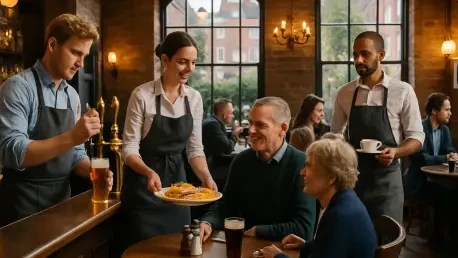Short introductionWe’re thrilled to sit down with Katarina Railko, a seasoned expert in the UK hospitality and tourism industry. With a wealth of experience in travel, entertainment, and events, Katarina has become a prominent voice in the sector, particularly through her work with expos and conferences. In this engaging conversation, we explore the current state of Britain’s hospitality landscape, the economic and social impact of the industry, and the evolving relationship between the sector and government. Katarina shares her insights on advocating for businesses of all sizes, the importance of a unified voice, and her vision for a thriving future in hospitality.
How do you view the current outlook for Britain’s hospitality sector, and what fuels your optimism despite the ongoing challenges?
I’m genuinely optimistic about the future of hospitality in Britain, even with the hurdles we face. The sector has shown incredible resilience, bouncing back from tough times with innovation and determination. I’m particularly encouraged by the growing recognition of our economic impact—hospitality contributes billions annually and supports millions of jobs. Plus, there’s a renewed focus on creating memorable guest experiences, which keeps customers coming back. This positive momentum can inspire hotel managers and staff to push for excellence every day, knowing their efforts are part of a bigger, brighter picture.
Can you share some highlights from your discussions with government leaders about the hospitality industry’s role in the UK?
Absolutely. When I’ve had the chance to speak with senior officials, my focus has been on showcasing how vital hospitality is to the nation’s economy. We’re talking about significant revenue from tourism and local spending that fuels growth. But beyond the numbers, I emphasize our social contributions—how hotels, restaurants, and events bring communities together and create jobs, especially for young people or those entering the workforce. It’s about painting a full picture of how we’re not just businesses, but cornerstones of local life.
What does it mean for an organization like yours to represent such a diverse range of hospitality businesses, from small independents to major chains?
Representing everyone from a cozy bed and breakfast to sprawling hotel chains is both a privilege and a powerful tool. This diversity gives us a comprehensive understanding of the sector’s needs and challenges, which is critical when engaging with policymakers. It means we can speak for the little guy struggling with rising costs just as effectively as we can advocate for larger operators navigating complex regulations. This broad perspective helps us build a stronger, more credible case for support and change at the government level.
How has the presence of a dedicated hospitality focus within government, like a minister or unit, changed the way the sector’s issues are addressed?
Having a dedicated voice in government has been a game-changer. Before, hospitality often got lost in broader discussions about business or tourism. Now, with specific representation, our concerns—like staffing shortages or tax burdens—are taken more seriously and addressed with targeted solutions. It’s meant faster responses to crises and better policies that actually reflect our realities. For instance, we’ve seen more tailored support programs post-COVID, which wouldn’t have happened without that direct line of communication.
What are some of the most pressing challenges you’re currently championing for the hospitality sector in conversations with the government?
Right now, we’re laser-focused on a few key issues. Staffing remains a huge concern—recruiting and retaining talent in a competitive market is tough, especially with post-Brexit immigration rules. We’re also pushing back against tourism taxes that could deter visitors at a time when we need them most. On the flip side, there’s massive potential for growth through sustainable tourism and tech investments, so we’re advocating for incentives to support those areas. It’s about balancing immediate relief with long-term vision.
Can you walk us through a moment when you had to fiercely defend the hospitality industry, and what came of it?
There was a time during the recovery from the pandemic when there was talk of imposing additional taxes on hospitality businesses to recoup public funds. I stepped in to argue that this would cripple an already struggling sector. We organized data showing how many jobs and small businesses were at risk, and I met with officials to humanize those numbers with real stories. In the end, we managed to delay and reduce the proposed measures, giving many operators the breathing room they desperately needed to rebuild.
In what ways do you promote hospitality as an attractive industry for both workers and investors?
I love highlighting the unique opportunities in hospitality. For workers, it’s about the chance to grow—starting as a server and working up to management is a real path here, with skills that transfer anywhere. It’s also a vibrant, people-centered environment, which appeals to so many. For investors, I point to the sector’s adaptability and the steady demand for travel and experiences. Whether it’s boutique hotels or tech-driven guest services, there’s room for innovation and solid returns. My goal is to shift the narrative to one of opportunity and excitement.
What is your forecast for the future of the UK hospitality sector over the next few years?
I see a sector poised for transformation over the next few years. With technology like AI and sustainability practices becoming more integrated, we’ll likely see smarter, greener operations that enhance guest experiences while cutting costs. I also expect a stronger push for domestic tourism as global uncertainties persist, which could be a huge boon for local economies. However, success will hinge on government support and our ability to attract talent. If we get those right, I believe we’re looking at a period of robust growth and renewed confidence in hospitality as a cornerstone of British life.









